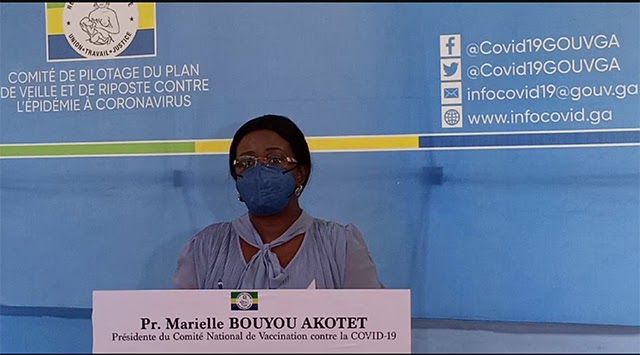#COVID19: Vaccinated Gabonese To Get Booster Doses
#COVID19 vaccination in Gabon is taking a new dimension as booster shots are being recommended for citizens.

Gabon citizens who had been vaccinated between March and July 2021 are to get booster vaccine doses against the COVID-19, authorities have said.
The date for the administration of booster vaccine doses is not fixed yet.
Prof. Akotet, the President of the National Committee for Vaccination Against the Coronavirus (COPIVAC), announced that only 21.07 per cent of Gabonese have so far received the complete doses of the COVID-19 vaccines in Gabon.
Akotet, at a press conference on Wednesday, Jan. 5, called on those who have not yet received the jab to do so immediately.
“Many countries that started vaccination before us, have remarked that five to six months after the second dose, there has been a diminution in the efficacy of the vaccine in the organism,” said Guy-Patrick Obiang, Health Minister, who accompanied Prof. Akotet during the press conference.
The Minister added that “in Gabon, the first vaccines having taken place in the month of March, we are within the window when it is important to take a booster dose.”
Akotet said all persons who received the Sinopharm, Pfizer or Moderna vaccines between March and July 2021 are eligible for a third dose.
“There are priority groups,” Prof. Akotet declared, referring to persons with comorbidities; those aged above 60 years and people with peculiar cases, which will be treated on a case-by-case basis.
“This booster vaccination will in the beginning not be effective at all the vaccination sites,” he announced, revealing that “within the shortest possible time, the administration of these booster doses will begin but not at all the vaccination sites.”
According to the Health Minister, with vaccination, the objective is not to halt spread but to reduce it and reinforce the immune system of the populations to avoid the development of more serious forms.
“No health system in the world can stop contaminations,” he said, revealing that taking charge of the more serious cases of the COVID-19 is estimated to cost the state 7 million FCFA (about 14,000 US dollars) per patient, whereas with vaccination, the state can reduce these expenses.
“Besides children and adolescents who are not yet eligible for vaccination, a large part of the Gabonese population can get themselves vaccinated,” chipped in the President of COPIVAC.
“The persons defined as priority individuals for vaccination do not represent even 10 per cent of those vaccinated,” Prof Akotet said, indicating that the vaccines currently available are the Pfizer, Moderna and Johnson & Johnson, underlining that some persons are ineligible for vaccination.
This group of persons are notably those who have suffered from COVID-19 within less than three months, those who presented serious allergies after vaccination, those who lost an abnormal quantity of blood after vaccination, and those with problems of coagulation.
“Persons who have been vaccinated one month before they were due for vaccination or those who have a vaccination envisaged one month after and those who have had a stroke are also ineligible for vaccination,” the COPIVAC president explained.
He further stated that “These persons benefit from a certificate of non-eligibility for vaccination established by COPIVAC and which contains information about the patient with the reasons for non-eligibility.”
According to him, the certificate would also have a Quick Response (QR) code with a well-determined delay, which is either ninety days for people who have suffered from COVID-19, six months for those with chronic pathologies, and renewable after presentation of a certificate from a doctor confirming the continuity of the pathology.
“Vaccination sites are open to vaccinate all the population,” the COPIVAC president concluded.
Support Our Journalism
There are millions of ordinary people affected by conflict in Africa whose stories are missing in the mainstream media. HumAngle is determined to tell those challenging and under-reported stories, hoping that the people impacted by these conflicts will find the safety and security they deserve.
To ensure that we continue to provide public service coverage, we have a small favour to ask you. We want you to be part of our journalistic endeavour by contributing a token to us.
Your donation will further promote a robust, free, and independent media.
Donate HereStay Closer To The Stories That Matter




